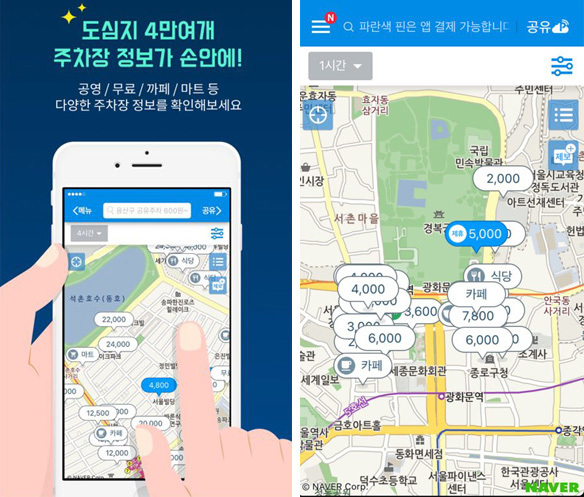[Weekender] Parking made easy via smartphone applications
By Lim Jeong-yeoPublished : May 25, 2018 - 15:57
From parking towers to vehicle elevators, South Koreans have found ways to alleviate the chronic parking space shortage. In particular, parking is a nightmare in Seoul, as the city’s nearly 10 million-strong population inhabit just 605 square kilometers of land and many households own more than one car.
But with the advent of technologies, the struggle of finding a parking space is becoming less excruciating.
Living up to its reputation as the most-wired nation in the world, Korean companies have developed real-time GPS mobile applications that provide users with information on adjacent parking spaces and the price per hour.
Fledgling services such as the Modu Parking app have seen a steady rise in demand. In the five years since its launch, the Modu Parking app has been downloaded over 1.7 million times. It has more than 40,000 parking lots registered in its system, according to the developer.
But with the advent of technologies, the struggle of finding a parking space is becoming less excruciating.
Living up to its reputation as the most-wired nation in the world, Korean companies have developed real-time GPS mobile applications that provide users with information on adjacent parking spaces and the price per hour.
Fledgling services such as the Modu Parking app have seen a steady rise in demand. In the five years since its launch, the Modu Parking app has been downloaded over 1.7 million times. It has more than 40,000 parking lots registered in its system, according to the developer.

“Korea has an extremely developed parking system, such as the lights that guide a driver to an empty parking space at shopping malls and automatic recognition of car plates,” said Kahng Soo-nam, co-founder of Modu Parking.
“But people just don’t know where to find these parking lots, or jump to conclusions that they will be expensive and end up illegally parking on the roadside or on the pavement.”
Illegal parking in Seoul can result in a fine of 40,000 won ($37) to 60,000 won, depending on the size of the vehicle and the number of hours it was parked.
In the face of strengthening parking regulations, methods to find legitimate ways of parking are increasingly in demand.
Kim Hyung-zip, 41, an office worker living in Seoul, uses Modu Parking as his main go-to app for locating parking spots and the Kakao T app as a backup.
On Modu Parking, Kim swipes on the map of Seoul to search for his destination. The map instantly reveals nearby parking spaces as pins with price tags attached.
Using filters, Kim can zero in on his preferred choice of a parking lot, from free-of-charge spaces to private or public lots. He can also find parking spaces attached to a cafe or a restaurant, and get information on whether the parking lot operator accepts credit cards or cash. If paid via the app, the parking fees may be discounted. The app provides GPS navigation to the parking lot, facilitating the trip.
Although sometimes he has to park farther away from his destination, Kim finds it reassuring to use the apps to park.
According to Modu, its service also promotes a sharing economy. In regions where Modu Parking is available, people with residential parking permits can register parking spots in front of their houses or shops with the app and choose a particular time and day when others are allowed to legally use the empty slots for a small charge. Modu Parking takes a premium in the process.
The service, currently only available in Korean, covers Seoul, Gyeonggi Province and six other metropolitan cities.
Meanwhile, heavyweight firms are leading the parking information system market with their wide networks and infrastructure.
Telecommunications giant SK Telecom’s navigation system T map and Korea’s top mobile messenger service Kakao Corp.’s Kakao T are among strong players in the market. Seoul city also has its own parking lot app.
By Lim Jeong-yeo (kaylalim@heraldcorp.com">kaylalim@heraldcorp.com)











![[Today’s K-pop] BTS pop-up event to come to Seoul](http://res.heraldm.com/phpwas/restmb_idxmake.php?idx=644&simg=/content/image/2024/04/17/20240417050734_0.jpg&u=)




![[KH Explains] Hyundai's full hybrid edge to pay off amid slow transition to pure EVs](http://res.heraldm.com/phpwas/restmb_idxmake.php?idx=652&simg=/content/image/2024/04/18/20240418050645_0.jpg&u=20240419100350)

